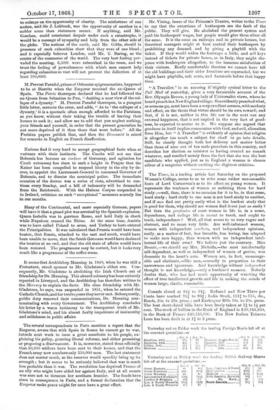The Times, in a leading article last Saturday on the
proposed Women's College, seems to us to echo some rather unreasonable fears of Lord Carnarvon's as to its effect on young women. It represents the weakness of women as unfitting them for hard study ;—well, then, there is no occasion for it to be, in that sense, hard study ; hard study to one man is not hard study to another, and if men find out pretty easily what is the hardest study that is good for them, why should not women find it out just as easily ? But then the profession of most women in life is, in a sense, dependence, and college life is meant to teach, and ought to teach, independence ? Well, all that seems to us very vague and abstract, and to mean very little. Are well-informed women, women with independent intellects, and independent opinions, really, as a matter of fact, less loveable, less loving, less adapted to make men happy, than women with no independent intel- lectual life of their own? We believe just the contrary. Miss Bronte,—we should say Mrs. Nicholls,—the most intellectually self-dependent, as well as independent of women of genius, was domestic to the heart's core. Women are, in fact, unmanage- able and obstinate, —like men,—usually in proportion to their narrowness and ignorance. And knowledge without independent thought is not knowledge,—only a burdened memory. Nobody doubts that, who has had much opportunity of watching the effect of true intellectual growth and life in making the minds of women large, elastic, reasonable.


































 Previous page
Previous page